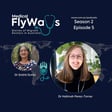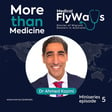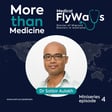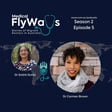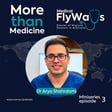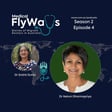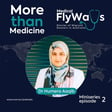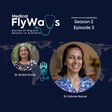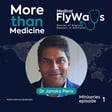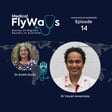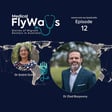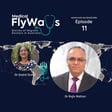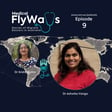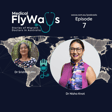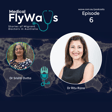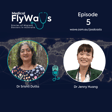Become a Creator today!Start creating today - Share your story with the world!
Start for free
00:00:00
00:00:01

Episode 10 - Dr Rhea Liang
Dr Srishti Dutta catches up with Gold Coast general and breast surgeon Dr Rhea Liang. Having completed her primary medical degree in New Zealand, she is also the clinical Sub Dean at Bond University. A daughter to a Hong Kong migrant doctor herself, Dr Liang would inevitably follow her father's footsteps by migrating with her husband to Australia after completing her medical training.
Recommended
Transcript
Introduction of Dr. Ria Lang
00:00:01
Speaker
Medical Flyways, The Untold Journeys of Migrant Doctors in Australia.
00:00:13
Speaker
Thank you Dr. Ria Lang for being with me today on the podcast. Dr. Lang is a general and breast surgeon who works in the Gold Coast and has done her primary medical degree in New Zealand. She's also the clinical sub-dean at Bond University.
00:00:28
Speaker
And I first met her at an event which was Women in Leadership that was hosted by the AMA in Brisbane. And after a few minutes of hearing her speak, realized that this was the same person that I had been following on then called Twitter, which is now called X, and have always had a bit of a fangirl crush on her, which she's well aware of. ah So thank you so much for being here, Ria.
00:00:54
Speaker
It's my pleasure. And so I should add that I originally asked a few questions of you around leadership and women in leadership.
Journey to Australia
00:01:03
Speaker
But having discovered that you, like me, are a migrant doctor, I'd like to hear about your journey and maybe even your reasons of moving to Australia.
00:01:15
Speaker
Yeah, i'm i'm I'm like a little leaf in the wind so all my moves have been caused by things other than myself. So I was born in Hong Kong and that was accidental. So even though I'm Chinese and I look like I ought to have been born in Hong Kong, my parents and my older sister were New Zealand citizens and my older sister had been born in New Zealand.
00:01:36
Speaker
mother had been given the kind of old wives' tale that ah recent pregnancy and breastfeeding and that sort of thing was was effective contraception. which it wasn't. But in the days before easy kind of pregnancy testing and ultrasounds, she didn't actually realize that she was pregnant again until relatively late in the piece. And by then they had already arranged, you know how it is in ethnic families. the first my old so My older sister was the first grandchild. And so there that there was this big push to get her back to Hong Kong to meet the aunts and uncles and grandparents. So they'd already planned this big trip. So mother went on this trip with father and I arrived.
00:02:14
Speaker
in Hong Kong. And because she now had two children, so my older sister and I are barely 12 months apart. So with two young children very close together, they actually chose to stay in Hong Kong a little bit longer to have the supportive family. And so we moved back to New Zealand when I was 18 months old.
00:02:32
Speaker
I grew up in New Zealand, went to medical school, did all my training there right up until receiving my FRACS. And then my husband, who is a psychogery attrition, got his first sort of substantive job offer from Gold Coast Health. And being a dutiful Wi-Fi followed him over here and have been here ever since.
00:02:53
Speaker
I've got two questions to follow that up with then.
Family Background and Migration
00:02:55
Speaker
So your now I know that I've read that your father or and your grandfather are doctors, if I'm right. Yes, yes. So so was was he in New Zealand as a migrant doctor as well? He was. So there was a Commonwealth exchange program.
00:03:12
Speaker
in the 1970s. New Zealand had this problem where because it was a very small country back then, I think it only had a population of 3 million, each year they would train you know two trainees in each specialty and the trainees would go off and do their fellowship in somewhere like London and then they'd never come back. So New Zealand decided that it was going to poach skilled medical staff from other Commonwealth countries. um So there were these scholarships that were often to ex-British colonies, places like Singapore and Hong Kong. And the deal was that they would give you a taste of the New Zealand life with the house and land and you know i show you the scenery and take you fishing. And you could try it out for a year. And once you'd finished your year, you could go home. Or if you chose to stay, the house and land actually became yours in a rent to buy sort of arrangement.
00:04:00
Speaker
So my father came out as a paediatrician. He loved it. I mean, no one gets a house and land in Hong Kong, you know, and, you know, quickly converted to the New Zealand lifestyle and stayed there for the rest. I mean, he's still there. And he did he ever consider going back?
00:04:16
Speaker
I mean, we used to go back, I mean, in the early days, it was very expensive to go back and it was a three trip, ah three plane flight trip. So you'd go from Auckland to Sydney in a smallish plane and then change to a larger plane. But back then, you still could not do Sydney to Hong Kong in one go because of the limitations on refueling.
00:04:37
Speaker
and They didn't have, this is the 1970s, they didn't have the big you know jumbo jets that we have now, and so we'd stop off at Nandi Fiji. So we'd go Auckland, Sydney, Sydney, Nandi, Nandi, Hong Kong, and this whole thing would take about 36 hours, which is very demanding when you've got two small children. So we didn't go very often when I was a small child, but as air travel became easier and cheaper, we ended up at the point where we would head back to Hong Kong almost every year or two.
00:05:04
Speaker
So it's fascinating because I've i now interviewed three doctors whose parents have also been migrant doctors and you know hearing the stories there they're still very different from each other but you know so there definitely is in today's world two generations at least of doctors who have migrated from their country of heritage or birth and have lived elsewhere. Are there any parallels in your journeys or have you ever talked about that with your dad?
Influence of Anti-Racism Values
00:05:35
Speaker
We talk often, so I'm very close to my father, and I was inspired by him because he was an early proponent against racism. And you can imagine in 1970s New Zealand, this set him up to receive a fair bit of pushback. So I remember getting flyers in our letterbox saying, go home. Or there was there were times when the old landline phones, um it would ring. um And we all had beautiful phone technique because when you lived in the household of a doctor, you knew to pick up the phone and say, good morning, this is Ria speaking, who are you looking for? Or how can I help? you know Because it was a doctor's household. And you'd end up with some screaming woman on the other side going, you know F off, back to where you come from, we don't want you here, blah, blah, blah. And I'd hear my father's voice from the next room kind of going, just hang up, Ria, just hang up.
00:06:25
Speaker
you know So I can only guess at what he may have encountered in the workplace or in his daily life, but he it didn't dissuade him from speaking up. And I have been brought up, I think, with that spirit, you know that idea that you can't leave this earth. you know You're not going to be on your deathbed having regrets about the times you stayed silent. You must speak up for what's right.
Involvement with Respect Project
00:06:51
Speaker
And that leads me to my questions around the work you've done with the college, the Royal Australian College of Surgeons. And I am aware that, you know, the respect project that you have designed and I think at least the surgeons are well aware of it now because I'm told it's a mandatory module that they all have to do. Would you like to tell us how you landed with that and what you've already spoken to the inspiration, but what else was that like being a trainee migrant doctor being a surgeon who was female in those early days. Yeah. So just to say I didn't design, well, I suppose I played a part in designing it. What I did was I chaired the education committee. So the ah ah the building respect project for the College of Surgeons is a very large project with eight separate parts. And the education section is just one of those parts, but possibly the one that's most well known.
00:07:46
Speaker
And I wasn't even the first chair of that education committee. Adrian Anthony, who's now the sensor in chief of the college, was the first chair. um But as the deputy chair, I think I became associated with it because I was seemed to be the only person on the committee who was on social media. So, you know, posting the links and doing the ad, you know, the the posts for it, I think people associated me with that project. And of course, in time, I became the chair.
00:08:11
Speaker
of the project. We've been lucky that we've had really good leadership support all the way through. So for nine years now, College of Surgeons has not wavered from developing and delivering this program, even though it itself has had a fair bit of pushback from fellows who sometimes get quite resentful about the need to do education and to be held to standards of respect. How it started? Well, it was one of those things another time where I felt like I was a leaf in the wind because I had been quite outspoken through my training about things like gender equity, particularly when my maternity leave had been initially denied, and then when we pointed out that it was actually illegal for a workplace to deny someone maternity leave, they said that it would not be conducive to staying on the surgical training scheme.
00:09:00
Speaker
And certainly they made it quite difficult for me to arrange a return to work program to arrange to be supported and breastfeeding in the workplace. And for the time I was there, we never really sorted those out. You know, they were continual bugbears while I was there.
00:09:17
Speaker
And I did almost leave surgical training twice of my own volition because it was getting so hostile. So by the time in my eighth year as a consultant when the operate with respect project was launched, I'd already been quite outspoken about equity and and in particular gender equity for a decade and a half, really, if you count all the training years. And all that time I had felt like I was throwing rocks ah from the outside of Castle, you know, just standing outside kind of throwing little rocks at the walls kind of going, let me in. Hello, I'm here. Let me in. I'm told that. so So you might remember the operate with respect program started with a sentinel event, which I won't go over, but basically ah a sentinel event involving sexual harassment of a trainee.
00:10:03
Speaker
And when the college was trying to figure out what to do about that, I am told that someone in the executive said, there's that woman who's quite noisy about these things on the block. OK.
00:10:15
Speaker
Yeah. And so from my point of view, I got this very mysterious phone call that started off, hello, it's so and so here from the College of Surgeons. Do you have a moment to talk? And of course, those phone calls always might fill your heart with dread because you think, oh dear, what have I done now? you know The person on the other end very quickly explained that actually they needed my help on this project. And could I get down in person to Melbourne within the next three weeks because they needed to formulate a response quite rapidly? Remember, this is in well before the COVID days when we had no ability to teleconference.
00:10:45
Speaker
ah So I duly got leave from my manager at the time and headed down to Melbourne and that was the beginning of it. We we literally, you know, five or six surgeons in a room kind of banged out the the bare bones of the what then became the building respect project. And initially we were a reference group, then we turned into a steering committee and then finally we reconstituted ourselves as proper committees for the delivery of this. So that was the beginning of it.
00:11:10
Speaker
ah Such a great example of following on with your passion and putting it in action when the opportunity arose. I have ah another question then is, did you feel prepared for it? Did you know what you were getting into and do you feel it has had the impact that you thought it might? Yeah, I mean those are big questions. Did I feel prepared for it? Not really, but we were really well supported. So the College of Surgeons gave us two full-time staff.
00:11:39
Speaker
like I'm not allowed to disclose the figures because you know they're sensitive, but the budget allocated to this thing ran to seven digits, not six. but There was a clear um ah you know clear will and commitment to following through. Yeah, which was a significant change from previously. so Of course, it's not that this had ever been the first incident of sexual harassment ever reported to the college, but I think in the social the social norms had changed to a point where it was now a problem. And they the one good thing about surgeons is when we decide to do something, we do it properly. And we've had that level of support all the way through, like I say, for nine years, which I'm very grateful for. um So I didn't feel prepared for it, but I felt very well supported. As for knowing what to do, I think it's one of the illustrations of diversity, because in amongst my various other qualifications, I do have a Bachelor of Arts with education and sociology kind of rolled into that Bachelor of Arts. And
00:12:32
Speaker
Even though when we looked at the literature, nothing like this had ever been done by any professional college, not in Australia, not globally. Nevertheless, we did have literature a small amount of literature from other hierarchical male-dominated pursuits, business, engineering, the military, those sorts of places where they had addressed these things.
00:12:52
Speaker
And then with my sociology background and my education background, of course, those were the sort of theoretical basis for putting together what is now the education focus of the operate with respect project. So although it was all novel, it wasn't like we plucked it out of the air. It was all based on good research and evidence from theoretical frameworks. Yeah.
00:13:15
Speaker
And do you think it has had an impact? Oh, yes, it has had the initial impact we expected, but that has made us set our sights even higher. So initially, we thought, you know, very basically, we will deliver education to everyone, you know, every surgeon, every trainee and every applicant to training as well as all the IMG surgeons coming from overseas so that everyone has a common basis of knowledge. That was the initial aim and the, like I said, education portion was one of eight streams of the program and so the other streams would kind of rest on the assumption that everyone associated with the College of Surgeons had this core knowledge. As time went on and we achieved that goal, we were like, what if we upskilled the leadership to manage
00:14:05
Speaker
reports of bullying, harassment and discrimination better. And so that was the genesis of the operate with respect course, which is also still going. And then now, of course, we're starting to engage more widely. So we're starting to engage other colleges, we're starting to engage other professional governance organisations and we're engaging with the Commonwealth Better Culture Project to see if we can get a little bit more of a unified approach across the healthcare sector because we became aware that with healthcare becoming more complex and multidisciplinary, it wasn't making any and any difference in a team setting if just the surgeon was upskilled.
00:14:46
Speaker
when you're one but person and actually the interactions are with, and of course those interactions in a multidisciplinary team have their own hierarchical structures and power imbalances that it's trying to address to create the right outcomes. Fascinating. So, but that's, you know, that's a really interesting thing you said is that you set your goals higher, which means there is inherently a process to reassess, see where you're at, see what's working and improve it and progress the work. Yes, that was where my education background came in. So we very much said, look, this is a learning exercise. This is novel. We are not going to be like some shiny corporate thing where they say, year one, this is our goal. Year two, year three, you know and you have a shiny little new five year plan. It was more that cycle like you're learning a new craft or a new subject where we're like, OK, we will roll out the next phase.
00:15:42
Speaker
figure out what we learned from that, be very alert to unintended effects or negative effects and make sure we address those. And because the whole landscape is changing rapidly, you know, the social norms are changing rapidly, the legislative requirements are changing rapidly, the expectations of the younger generation are changing rapidly, you know, we will become more agile if we don't fix ourselves into these kind of long plans.
00:16:08
Speaker
We do actually have, yeah you know, we've had the original operate with sorry building respect plan and we've had the relaunch of that in 2022. So those are sort of big pegs in the sand and they do forecast what we plan to do, but the actual nitty gritty is very much a learning exercise. You just made me think of a foot of quotes at the moment. I think it's Adam Grant who says, the speed at which you learn has to be faster than the speed at which things change in order to continue to be relevant. Yes.
Exploring Equity and Inclusion
00:16:39
Speaker
Very wise words. Yes. I was going to ask you, what do you and this is kind of steering into principles and probably more theoretical question, but what do you think is the connection between equity and inclusion, if any? oh Well, they were inextricably linked. We won't have one without the other. So we can't have equity without inclusion, we can't have inclusion without equity. But actually, there are only two parts of what I see as a sort of four-part kind of process. You can have equity of approach and that can be in policies and guidelines and everyone saying the right things, but that's not the same as inclusion, which is the actual action of including people. And then being in the room is not the same as belonging or being valued. So those are the last two things that I think need to be included. So belonging is that feeling like
00:17:34
Speaker
you're not just in the room, but the meeting actually can't start until you arrive. Because it is interesting to me how disposable some people are. you know I feel this very deeply on behalf of Indigenous colleagues in particular. you know People will say, oh, we must include an Indigenous person, but so often Indigenous people are so underrepresented that there's only one person who's stretched between multiple different committees and commitments. And then when they're not there, people still carry on with the discussion about what shall we do about Indigenous this and Indigenous that. Even when they're not there, you know, and it makes it very clear that they are dispensable, they're not essential to the conversation, and so they don't really belong.
00:18:18
Speaker
we went through that phase with women and we went through that phase with LGBTQI people. you know But you would never dream now of formulating a program for women without including the women or talking about LGBTQI people without someone from that community there. And so it's that maturity, I think, as we meet these social challenges to understand that there has to be equity and inclusion and belonging. And then the last thing, which is valuing.
00:18:47
Speaker
So, when I talk about valuing, I like to use the example of the court jester in old sort of King Arthur days. you know The jester is there, they are diversity, and they are twet treated equitably, I suppose, in a way. They are included. They're an essential part of the king's court.
00:19:09
Speaker
They belong, as in everyone likes the jester to be there and they're essential to the entertainment at the banquets, but they're not valued. They're there to make everyone laugh. And I have to say, as the token woman or the token international medical graduate or the token younger fellow in a number of committees, that's how I felt. I felt like I was there to be the court jester. I could not seem to make myself be taken seriously. And I think, Shrestha, you'll know that feeling when you say something, that's the idea, and it vanishes. But then someone else with more privilege will say the same thing again, and suddenly they're taken seriously. So that's the valuing. Yeah, so it's those four things, equity, inclusion, belonging, and valuing. Without those four things, we're not going anywhere.
00:19:59
Speaker
Yes, I do know that feeling. And sadly, like I should add that there have been times when I've, you know, and, and, you know, I mean, I think the other challenges often The experience that you have in this regards to this can sometimes be so lonely is not the word, but I think you're the only one there at that point of time experiencing it. And when you when you're trying to even ah introspect yourself, you kind of sometimes run into these little corridors of self-doubt, if I might use that. and And if you seek feedback, I think sometimes it's also seen as
00:20:34
Speaker
a lack of ability rather than a willingness to learn from that experience so yeah i've i've had those moments too very much so and sometimes if i am in the right mood i will probably even jump up the wrong tree and say but i said that and and then go oh should maybe i shouldn't have said that
00:20:55
Speaker
I mean, it's wonderful actually that I've had some really great allyship just in the last few years. So I think people are becoming aware of that. So yeah from time to time, it's still rare, but from time to time, it's amazing when that happens and someone will go, ah someone with privilege will go, I think we have said that about five minutes ago.
00:21:13
Speaker
It's the most incredibly validating and inclusive thing. And so if we've got listeners who have privilege and are wondering what they can do, yeah, being alert to that possibility and just being the person who says, I think someone so said that five minutes ago, you know, it's as simple as that. Yeah. And I think a lot of, I think our relationship is an interesting space because again,
00:21:34
Speaker
We are so concerned about getting it right sometimes that we hold back on that even when we, you know as in the I mean, again, speaking of that, i I see myself as an ally because I have become more aware of my privileges. So you you can be a good ally as long as you're aware of your own biases and privileges is how I've landed. And I'd love to hear if you would add to that because I'm sure that each one of us has the potential to be an ally to someone else. We do. Every single one of us is an intersectional creature.
00:22:10
Speaker
you know none of us is completely oppressed or completely privileged. And I think having that view saves us from falling into kind of the pitfall sometimes of just seeking revenge. I mean, it's difficult sometimes. So I i remember someone I was trying to mentor who was a very strong feminist. She she was upset about the need to remain gracious.
00:22:34
Speaker
And I was saying, well, I don't know that we get much traction being rude to people or swearing at people, which is a behaviour that she had exhibited. And she said, she said look, it's like this. you know Johnny and Jane are expected are at the park, and they're expected to share the swing. And Johnny's been on the swing for 50 years. And so what you're telling me is that Jane now has to share the swing 50-50 with Johnny, rather than getting another 50 years on the swing to make it make the past inequity right. This is a fascinating but it is a fascinating thing because it really took me a while to get that concept and she really did us a favor by explaining it this simply but if the corridors of power are lined by portraits of a certain kind of let's say individual and we only choose one metric to replace there we effectively are simply changing the person that facilitates a hierarchical structure.
00:23:33
Speaker
We're not really making it more inclusive. We're just changing it on one metric, on one of identity of diversity of identity. So inclusion would mean that, yeah, Johnny and Jane would get 50-50, or that Jane would have more of a say in deciding how much time is being spent, or that they both find a better way to solve the problem.
00:23:59
Speaker
Yeah, you know, I mean, we can stretch this analogy as far as you like, but it's like, well, Jane can ah talk to Johnny and say, well, you know, you've been on the swing for a long time. How about we share it? Not only that, can we invite some friends? And while we're at it, how about we agitate for something other than swings like a sliding around about, you know? That's right. Yeah. And swings. Yeah, yeah. So, I mean,
00:24:21
Speaker
we're very much stretching the analogy now. But it's that sort of thing where I understand where she's coming from. you know she's In a trauma-informed view, she's privatised and she wants revenge. But if we're going to move forward in this, we have to be intersectional. So that means not only can we be allies to other intersectional beings, regardless of their dimensions. So for me, a lot of my advocacy is for rural surgeons, for LGBTQI surgeons, for Indigenous surgeons, and more recently for neurodiverse surgeons. So it's that feeling that we are intersessional, we can help other intersessional people. And the upshot of that is that we must also ourselves refrain from casting people
00:25:10
Speaker
in the same stereotype you know it's not going to help us to call people bills or dinosaurs or pale male stale or you know those sorts of phrasings because then we're just reproducing the discrimination that we have itched about ourselves for so long.
00:25:29
Speaker
Yeah, it's and it and it's you know interesting the way you've got us there and and I think for many of us it is a lot of healing work as well. Understanding where your own strong emotions and feelings come from before you feel the need to act on them.
00:25:46
Speaker
or if you feel the need to act on them more often than you are comfortable with as well. so yeah And I do think you know there there has to be a safe space for people to vent that you know on a trauma-informed view, you can't take someone who has been traumatized over a long period of time and say, all right you know We're going into these committee meetings where we're going to talk about equity. You must not swear. You must not put anyone down, blah, blah, blah, blah, blah. It's like, well, no, I think we recognize the emotions and give people safe space to vent it. But we should probably say maybe not on the committee meeting because ah you know that's not helpful to our cause. It's unhelpful. Yeah, absolutely. Yeah, absolutely.
00:26:25
Speaker
So that leads me on to my next question, which is more around you know showing up as your authentic self, as as someone suggested to me. and you know Each one of us has so many different roles, and you know real and other, cultural or otherwise, kind of human roles. And then you have your professional roles, then you have your personas, and you know somehow at every moment in your life,
00:26:50
Speaker
All right many of these you have to show up as a whole like as a you know as your whole true authentic self and given all of this work that you have done what does you know how do you look after yourself so you can have the energy and the kind of commitment and the will to show up again and again as your whole self.
Maintaining Life Balance
00:27:10
Speaker
Yeah. I mean, it's very trite. I'm probably going to say the same thing as everyone else, but your family and those you trust around you in a professional sense are important. So you have to build that network that holds you tight through the tough times. And there's been some really tough times. You know, I've had, as you might've seen from my twitter or xfeed You know, some really horrendous bits of hate mail have come my way. So, yeah, your family, trusted colleagues. Beyond that, it's really important to have your hobbies. I think that's why I'm so open about my hobbies on Twitter because ah behind every professional person has to be some way of winding down.
00:27:48
Speaker
you know And so I garden, I dance, and I crochet. And I think it's good to be open about that, or you know i've I've been glad to be open about that and show people that you don't have to be this harder steel surgeon all the time. And then the last thing that's happened sort of in the last few years has been that it's Finally coming full circle, you know, I meet consultant colleagues who say, you know, I very nearly left surgery until I read that paper you wrote or I'm a radiologist now, but just when I thought I was going to leave medicine completely, I saw a post you wrote about this and it helped me navigate through or put me in touch with someone. So you start to see the fruits of your labors and being able to add to the diversity of the workplace because you have encouraged people to keep going when they might otherwise have
00:28:36
Speaker
found an alternative. I kind of wonder whether you're also humble enough to see that your contribution and your role is to leave this, you have already kind of left and done enough to leave the place in better for those that come after. So do you have your target set on anything bigger or better in the future? Is there anything else on the horizon that that is shinier and or is it more in the same space?
00:29:06
Speaker
Well, like I said, I've very much been a leaf blowing in the wind and so I am perhaps guilty, like a lot of people, yourself included Trishti, that there are too many opportunities and we are very bad at saying no.
00:29:20
Speaker
So I'm very pleased to be doing the Commonwealth work, you know, with better culture. I think I hope it will lead to better things. But the other thing, too, is I don't know if you're aware, but extreme longevity is normal and for the women folk in my family. The women folk live to past 100, typically. So how we view our lifespan and our careers is perhaps different to other people. You know, even before I went to medical school, I already had teaching qualifications and piano and ballet, for example.
00:29:48
Speaker
medicine was not my first career as I see it and it won't be my last career because medicine by the nature of it will generally end in your 60s or perhaps if you're very lucky in your early 70s. For me, I'm like, well, what am I going to do for the next 30 years after that?
Career Longevity and Adaptation
00:30:06
Speaker
So it's that feeling that even now in my 50s, you're thinking, okay, what comes next? you know Do I work harder on the education? Do I work harder on federal or national or international level? And of course, as you know, I have done some. I've been very fortunate to have some opportunities to do international work as well.
00:30:24
Speaker
So the actual kind of clinical operating surgical career is just one chapter in a book that will have many chapters. And I think in some ways it's a very healthy view because one thing that struck me was for something like surgery that people give up a lot for,
00:30:45
Speaker
People have tended to cling on to it for too long, and sometimes it leads to them leaving in disgrace you know when the complications start to build up or they start to lose their lose their cognitive facilities. and I saw several colleagues leave surgery under a bit of a cloud when, in actual fact, if they'd stopped five years earlier, everyone would have thought the you know the memory of them would have been as some sort of surgical god, but unfortunately everyone now remembers them as a shadow of their former self, unfortunately. And so I think one of the pieces of work I'd love to do going forward is helping people to see life more like that, that we're not so wedded to our specialties that we have to slave away at it until we very nearly fall over.
00:31:31
Speaker
And I think that philosophy has become more stark since COVID. More and more I'm talking to people who say, you know what? I'm not going to be a GP to my dying days, you know or I'm not going to be a physician. you know I want to do other things. I want to try out other things. I want to have a portfolio career, or I want to work part-time and indulge in the love of my life, which may be in the arts or the humanities.
00:31:55
Speaker
and and it's interesting that we you know It's fascinating. We talk about it and we often speak of expectations placed on us, but my interesting experience, and this is a recent one, has been that they're often expectations we place on ourselves, not necessarily what others place on us. and You've just called that out beautifully for for many of us.
00:32:18
Speaker
called it in, maybe not called out, is how you did it. But the patients that I often find a challenge to work with are often the first ones that, if I am absent because of ah you know say an intercurrent illness, will say, you know you know that I know that it takes a lot for you to look after me. I hope you're OK. So it's very it's quite humbling when that comes your way to realize, do you know what? They do see you and accept you for who you are.
00:32:44
Speaker
and the expectations you place on yourself and are often your own and not just what others place on you. Yeah, yeah i think I think we can, in surgery particularly, there was always all terrible sayings like, you know, those that can do and those that can't teach as though having another, and and the same thing was said about administration, the same thing was said if you worked part-time, you know, somehow you were not as good as those people who did a zillion hours and could stay awake for 36 hours and still be functioning and, you know, all those, all that kind of old stereotype.
00:33:19
Speaker
I think it's time to move on from that. I don't think it's a healthy way of you know setting up our specialty or any specialty. I think we should encourage people to have lots of strings to their bows and have that sort of career resilience, if things should change, to be able to take on another chapter in their lives.
00:33:39
Speaker
so if you were Speaking to somebody who has finished medicine and is on a different in a different country or continent and is in their way, in their process of coming over to Australia. I mean, if they listen to this, they probably should have had and a lot of tips already. But what would your top three tips do be for them, ah given that they're going to arrive here as a learner? What would your top three tips be for them? What should they consider doing? I think understanding that being uncomfortable is learning in itself.
00:34:12
Speaker
I know it can be very frustrating at first to feel like you're going nowhere. You know, there's so much to learn and so much to get used to, and you feel like you're not making progress, but understanding that that cognitive dissonance is learning in itself. Your brain is rewiring itself for a completely new culture and a new system of knowledge. And, you know, even coming from New Zealand, which is about as similar to Australia as it can be, I still had to learn new drug names and new systems and new policies, um new ways of doing things. and so If you're coming from a country that's even more dissimilar to Australia, just just you know give yourself a pat on the back for feeling and for being willing to feel uncomfortable sometimes for quite long periods of time because that is learning in itself.
00:34:57
Speaker
The second thing is to work really hard on forming those social networks. It is very comfortable to stick with people you know, people you immigrated with, people from your own background, but you do need to get out there and get the social networks with the locals and with local structures because they will be immensely helpful to you in helping you navigate.
00:35:16
Speaker
the various structures that you have to navigate. And then the last thing I would say to people coming from overseas is to say that when you find the moment, when when you've sorted out the essentials, found a job, are getting paid, getting clinically on top of the work, do see if you have a little bit of capacity to pay some of that forward.
00:35:43
Speaker
So to look after those who are coming after you, because whatever small amount you can give, I have been the recipient of such kindness and I try that to pay that forward myself. And I think we can create that community of care as IMGs for of those who are coming.
00:36:02
Speaker
after ourselves. But like I say, that's something you should not feel obliged to do. That's something you do after you've established the basics, like getting paid, got your kids into school, have some networks. But if if you can find some capacity for it, do consider it because it makes a very big difference to those who are coming after.
00:36:22
Speaker
Awesome. I have one other question. And honestly, I could ask you so many more. I remember asking you this question. And and I've shared it with smaller audiences. So I'm just making the audience larger by asking you this. This was at the leadership event. And I asked you, well, I asked the panel, how do you ensure that you can call out or challenge a microaggression in appropriately or in a helpful way?
00:36:50
Speaker
And I think what you said to me i was quite a landmark or milestone moment for me from my own personal journey's perspective. So I've shared it, but I'd like to hear it from you again. You'll have to remind me what I said. you You said that you had to ensure your psychological safety before you challenged anyone in regards to a microaggression.
00:37:15
Speaker
But we then had a conversation about how you can be that person without power, but still be able to ensure your psychological safety. Yes, yes. I mean, that is still true for me.
Addressing Psychological Safety and Language
00:37:30
Speaker
You have to do that careful social calculus.
00:37:33
Speaker
One of the early learnings in the operate with respect project, we had a slogan, the standard you walk past is the standard you accept, you must speak up. We have modified that because what we found was placing that equal expectation on all levels of hierarchy to speak up meant that the trainees and those without privilege were getting harmed.
00:37:54
Speaker
We don't all have the same privilege to speak up in the hierarchy. And so now I preface it by saying, you know, if it is safe to do so, then speak up. And of course, in the operate with respect course, we teach the skills that we expect leaders to have in speaking up. But if you are a trainee and you've done that complex social calculus in your head and decided that the risk of repercussion to you is too high, then actually you do have my permission to walk past in that moment.
00:38:22
Speaker
However, that's not the end of it. At some point, you must do something about it. It might just be that you like make a journal note and come back to it some years later. It might be that you speak to a trusted senior about it just so that they're aware. It might be that actually you don't address the original aggressor at all, but you throw your energy into some sort of equity-focused group, you know, work hard in your surgical society or work hard in the women in surgery group or whatever it is.
00:38:51
Speaker
But do something. Yeah, opting out is not an option. No, because that's what led us to having this culture in the first place. You know, people just deciding to walk past again and again and again.
00:39:03
Speaker
Yeah, but don't put yourself in harm's way. There is not the need to put yourself in harm's way, but you can take the energy that arises from that microaggression in whatever form. It might be dismay or upset or anger or whatever, but turn that energy into something useful.
00:39:23
Speaker
Awesome. Now I usually end with a bit of a rapid fire of words and I give you a word and you just say whatever you think about it, whatever comes to mind. So I've got three and I've modified them as I've spoken to you because we've spoken to so many things today. The first one is IMG.
00:39:42
Speaker
I'm a bit like, I'm a bit like Nisha Coach. You know, Nisha, she says, I hate that term. And I do too, in a way. I know we use it as shorthand because we understand what it means.
00:39:54
Speaker
But, you know, as we move towards person-centered language, you know you know, we talk about a person with a disability or a person, you know, with so they are a person first and foremost. And I'm thinking, why don't we extend that grace to IMGs, you know, calling them IMGs? It's like, so Anisha prefers the language, you know, that she is a doctor who happens to have done her training overseas.
00:40:19
Speaker
Yep. I think the strong sentiments regarding the brand problem have been expressed multiple times now. Someone hopefully is listening. The next word is legacy. Oh, my husband teases me about that. So buried somewhere deep inside my brain from medical school was Ericsson's psychosocial stages, which I had forgotten.
00:40:42
Speaker
And I can't remember which stage it is, but apparently I have reached the one where the question changes from who am I and what's my role in society? you know Because that's the question that drives your specialty training and you know trying to get your fellowships and working hard. So after that, you reach a stage where you think, you know what am I leaving behind? What is my legacy? And this apparently takes you into old age. So this is why my husband teases me about it. But it is worth thinking about now, what is my legacy?
00:41:13
Speaker
We will leave people with that thought for themselves. Last one is ah power. Power is a double-edged sword. You need it to make change. But it's not invested in a particular leadership role or in seniority or any particular dimension. If you look at someone like Greta Thunberg, you can be a teenager with neurodiversity and still have incredible power in terms of your thought leadership.
00:41:39
Speaker
We do need some of that power because without power, you can't make change. So really the issue is not with power, it's with the misuse of power in ways to diminish people or abuse people. If you're using power for good, then I'm all for it. I am so grateful yet again to have had the absolute pleasure and luxury to take up so much of your time. So thank you again, Rhea. And I'm sure by the time I meet you next, I will have a whole other set of questions ready.
00:42:09
Speaker
It's always a delight, Krushti. I love our interactions, whether it's online or in person. Fantastic. Thank you so much. Thank you for having listened to this episode of Medical Flyways. I hope you've enjoyed this episode and will return for future ones as well. We would like to give you the opportunity to nominate a guest or any person you feel who is a suitable guest and who may have inspired you in your workplace or journey. So please leave us a comment and we will attempt to invite them to our podcast.
